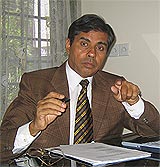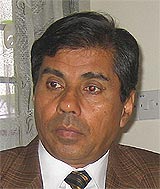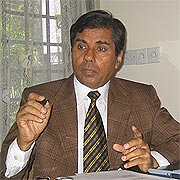In a recent interview with malaysiakini , BEIM chairperson Dr Zainal Abidin Abdul Majid signalled the urgency in preventing the National Integrity Plan from being derailed before 2008, the scheduled completion date for its implementation.
How can you sell the idea of a code of ethics to local businesses?
Early this year, we launched an inaugural award to recognise companies with exemplary business ethics practices embodied in their code of ethics with participation open to all local and international companies based in Malaysia. The award ceremony is scheduled for May 23 and we're expecting Domestic Trade and Consumer Affairs Minister Mohd Shafie Apdal to grace the event.
 The three or four GLCs (government-linked companies) who submitted their applications have benefited immensely because they now have a written recommendation by the assessors from the UiTM Centre for Integrity Auditing who will help them develop a code of ethics, if they don't already have one. It would be quite costly if they were to do it on their own but now it's a bonus we didn't expect.
The three or four GLCs (government-linked companies) who submitted their applications have benefited immensely because they now have a written recommendation by the assessors from the UiTM Centre for Integrity Auditing who will help them develop a code of ethics, if they don't already have one. It would be quite costly if they were to do it on their own but now it's a bonus we didn't expect.
But this effort must be followed through and the CEOs, board or top management must drive the agenda. PM Abdullah Ahmad Badawi himself is leading the initiative as Malaysia Inc CEO by introducing the National Integrity Plan (NIP). This is an excellent commitment by a country's CEO... makes it easy for the rest of the organisation's members to follow, adopt and support.
For their part, what can shareholders do?
In this country, shareholders are passive and so are the consumers, thus allowing misappropriation to exist due to the weak representation. (This is) a tough question to tackle but it goes back to the moral values of the board and the CEO. We've also seen time and again in the news of CEOs or senior managers being charged for misappropriation. The board must be aware and the auditors should be able to fish out all the unethical acts and violations within the company's operations that is unknown to others.
Where do we go from here?
I think Pak Lah has got something going. For the business sector chapter, it's only a question of rallying behind him to strengthen the business ethics culture. After that, we come to the public sector. In the government, there already exist comprehensive guidelines, codes and rules but despite all that, violations still occur.
In a transaction with the business sector, we have to ask whether there is a uniform code. This is the challenge... there's none. Malaysia Inc is a good concept of public-private sector working relationship but in this particular area, it has been silent and sadly no attention has been given. It's essential for a common code to prevail and be embraced by the private sector.
Who do you bribe?
If you know who to bribe, let's tackle the audience. The government should know who the target audience is. For example, remember the revelation not too long ago that bribery in the construction industry is part of the business culture? But what has happened since then? Who is monitoring this development? Is it better to ignore than to tackle head-on?
(At this rate), Pak Lah will not be able to achieve NIP by 2008, especially in the business sector. When there is a giver, there is always a receiver. But can the giver not give and the receiver not receive? And where the giver does not give but the receiver asks, the giver can say 'I'm sorry, there's now a new code and we're not allowed to give or we'll get into trouble'. Similarly, the receiver can say 'I'm sorry, I can't accept this because we have a very strict code now and your gift is tantamount to bribery. You can be charged, so please stop.
There must be a commitment by both parties, with the leadership in the driver's seat. This is why it's important to have a common code agreed by both parties. Once agreed, a task force can be set up to swiftly deal with violators according to the prescribed penalties. The government can then take action. In the pharmaceutical industry, non-compliance will be reported to the international bodies by competitors.
How do you plan to pitch the idea of a common ethical code?
The highest officials level of information exchange between government and private sector is the Malaysian Incorporated Officials Committee (MIOC) set up by (former PM) Dr Mahathir (Mohamad). I sit on the committee which comprises senior government officers, mostly secretaries-general and representatives and heads of the various chambers of commerce. As a business-friendly forum, it has the potential to move forward by taking up this issue as a committed agenda to design a common code of ethics.
Has the code ever been discussed at MIOC meetings?
 No, the MIOC has never discussed it as the matter has never been raised. I will probably raise it in my personal capacity at the next quarterly meeting scheduled for May 16 and mention the recent BEIM survey which ranked business leaders untrustworthy second only to politicians. The Chief Secretary to the Government chairs the MIOC which has representatives from selected national chambers of commerce, banking associations and a few invitees. What is more worrying is the fact that none of the chambers of commerce have come forward to know why business leaders were rated that low.
No, the MIOC has never discussed it as the matter has never been raised. I will probably raise it in my personal capacity at the next quarterly meeting scheduled for May 16 and mention the recent BEIM survey which ranked business leaders untrustworthy second only to politicians. The Chief Secretary to the Government chairs the MIOC which has representatives from selected national chambers of commerce, banking associations and a few invitees. What is more worrying is the fact that none of the chambers of commerce have come forward to know why business leaders were rated that low.
Is there a specific body to monitor business ethics?
I'm only familiar with the pharmaceutical industry and the Malaysian Pharmaceutical Association does monitor ethics. If there is a violation, there will be a complaint and action will be taken by the ethics committee. In other words, competition helps in the monitoring. In fact, the number of violations have dropped due to the system of monitoring, deliberations, penalty and government enforcement.
The NIP is one of the best things to happen to Malaysia after Merdeka 1957. Now it's time to actualise the plan. But I see the commitment to the plan is not up to a satisfactory level and we're already half-way through. For the business sector, there is a need for more action and focus by the authorities because if you leave it to the sector, they will just carry on as usual.
Is there a lack of political will?
The PM has delegated the (execution of the) plan to various leaders and now it's up to them to drive the agenda. There is also a need to monitor the progress, seek support by shouting or begging for it such as through motivational programmes, rewards and recognition like what we're doing with the code of ethics award.
Are national policies impeding ethical business practices?
Not at all. You work around those policies which are only meant to be a guide. Every country has its own policies for various reasons, political or otherwise. But wherever they exist, MNCs have worked around these situations. Just look at the hypermarkets operating in Malaysia. They have local equity and doing extremely well. As a businessman, you need only look at the positive side and work in partnerships.
Can you cite several instances of 'gifts'?
In a company, when one department receives goodies, hampers, crates of oranges during Chinese New Year and so on, they keep it to themselves. The head of department usually takes some home and shares the rest with the staff in complete violation of the code. As a company rule, no employee is expected to receive any hampers or goodies. In some instances, there's a value placed on the gift, say, not more than RM20 or RM50, and you have to declare.
When I was heading an MNC, I used to receive such reports. So, I decided to set up a committee on the receiving and giving of gifts. We wrote letters to all the vendors saying that as a policy we were unable to accept gifts, hampers or whatever at any point in time. We told them that we will return the gifts if they persisted in sending them to us. We also told them that if they refused to take them back, we will donate them to a designated charity.
I used to get birthday cakes sent by some hotels and despite telling them not to, they still sent them to me. Being perishable goods, I sent my driver to send them to children's homes. I don't need the cakes. What you need from suppliers are two things, that is, efficient service and the best quotation... nothing else. But they think that by giving that cake, you can favour them with more business.
How do you draw the line between courtesy and bribery?
You don't have to be materialistic or monetary at all. Just look at what happens when a top official in the public or private sector leaves office. Many CEOs, once they are out of office, nobody cares for them and they don't receive hampers and all those gifts. Is this about culture?
Take for instance the government officer in an influential position in the decision-making process. He gets all the gifts and whatever else that you can only imagine. But the moment he leaves office, do you think they'll go to his house and still give them? The courtesy is only attached to the business, the position. It is very misleading and corrupt thinking to hide behind culture.
Do we need more, or new, laws to combat corruption?
 To quote (former de factor law minister) Rais Yatim, we have enough laws in the country. The problem is enforcement. For example, petrol stations have three prohibitions - no smoking, engines switched off and no using handphones. But people continue to ignore these rules. Even when it becomes law, which is going to be soon, people will be hauled up but that will not stop them from repeating it.
To quote (former de factor law minister) Rais Yatim, we have enough laws in the country. The problem is enforcement. For example, petrol stations have three prohibitions - no smoking, engines switched off and no using handphones. But people continue to ignore these rules. Even when it becomes law, which is going to be soon, people will be hauled up but that will not stop them from repeating it.
How much does politics affect business?
Political actions does affect business in terms of integrity and trust because investors have to deal with policy-makers. Investors like a country where there is trust in the government, the system and the leaders. I believe the ruling party (Umno) is handling that now but how effective it is remains to be seen. The public sector and foreign community should know that the government will not tolerate money politics in party transactions.
What about the method of reporting bribes?
This is where we talk about protection for whistleblowers. I'm not sure if we even have them (whistleblowers). In Finland, for example, there is a parliamentary minister who is a whistleblower, the best job given to him . And today, Finland is ranked No 2 in Transparency International's 2005 Corruption Perception Index.
Here, BIEM (about 70 members) could be one of the avenue for whistleblower's but we don't have the resources, the manpower nor the money. I don't foresee us having that unless the government is serious about implementing good business ethics and sees us as one of the parties who can assist.
In Malaysia, whistleblowers are victimised and when such stories spread, who would want to do it? Who dares come forward? Be it in the government or private sector. But where whistleblowers in the private sector are recognised, protected and rewarded, it makes the policy and the code more effective. A whistleblower's law will be excellent for our country.

